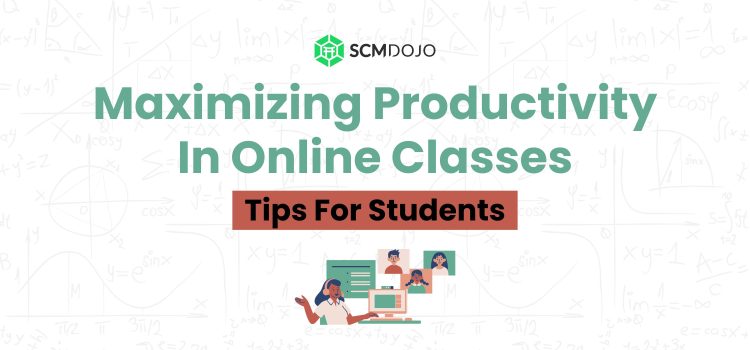Online education has evolved from being a supplementary form of learning to becoming a vital component in today’s academic landscape. Especially since the global pandemic, more educational institutions have adopted remote learning platforms or online classes to ensure continuity in education.
Effective in this virtual environment requires a different skill set and approach than traditional classroom learning. In that light, productivity takes center stage, influencing not just academic performance but also well-being and life balance.
However, online education also comes with its own set of challenges that can be detrimental to student productivity. Distractions are plentiful, be they digital or from the environment. Time management becomes a skill not just for assignment deadlines but for attending virtual classes punctually. The lack of social interaction can often lead to a decrease in motivation and focus. All these challenges make it even more crucial for students to develop strategies for maximizing productivity.
Whether you’re new to online classes or looking for ways to improve your current setup, this article aims to offer practical and actionable tips to boost your productivity. Writepaper could be one resource you consider to help with academic writing, but the crux of achieving success lies in your daily habits, tools, and mindset. However, it’s important to note that while Writepaper can write an assignment for you, fostering a deeper understanding of the material by engaging with the coursework and actively participating in discussions will ultimately contribute to your overall learning experience. Let’s dive into how you can set yourself up for optimal productivity in online classes.
Source: https://unsplash.com/photos/j9q2Qr-yzJ0
The Challenges of Online Learning
Distractions
One of the most common challenges of online learning is the plethora of distractions. Unlike a controlled classroom environment, home settings come with a multitude of interruptions—be it social media notifications, household chores, or television. Students often find themselves multitasking, which is detrimental to deep learning and engagement in class.
Lack of Social Interaction
The absence of a physical classroom setting affects peer-to-peer and student-teacher interactions. This lack of face-to-face communication can lead to feelings of isolation, reduced motivation, and a lack of classroom engagement. Students may find it more challenging to collaborate on projects, discuss ideas, or seek instant clarification on complex topics.
Difficulty in Time Management
Online learning often offers greater flexibility, which can be a double-edged sword. The freedom to schedule your own study time can lead to procrastination and poor time management. Many students struggle to create a balanced schedule that accommodates study time, breaks, and other responsibilities, ultimately affecting their productivity and academic performance.
Setting the Stage for Productivity
Creating a Dedicated Workspace
The first step in enhancing productivity is to establish a dedicated workspace. This area should be separate from your leisure spaces and free from distractions. A clutter-free, organized environment helps in concentrating better and signals the brain that it’s time to focus on academic tasks.
Setting a Routine
Consistency is key when it comes to productivity. Set up a daily routine that includes designated times for studying, attending online classes, taking short breaks, and engaging in leisure activities. This structure will help you manage time better and create a rhythm that’s conducive to learning.
Using the Right Tools
Invest in the right tools to facilitate your online learning experience. A stable internet connection, a laptop or computer with good processing speed, and quality headphones can make a significant difference in your educational experience. Software tools like note-taking apps, calendar applications, and productivity trackers can further assist you in staying organized.
With these foundational elements in place, you’re better equipped to maximize productivity during online classes. In the upcoming sections, we will delve into strategies for active engagement, time management, building a support network, and the importance of self-care.
Active Engagement During Classes
Active Listening
Active listening is an aspect of online learning that’s often overlooked. To make the most out of your classes, it’s important to not just passively attend but to actively engage. One way to do this is by taking notes during the class. Note-taking helps you concentrate and better absorb the information being presented. Consider using digital note-taking apps that allow you to sync your notes across devices, or go old-school with a pen and paper if that helps you focus better.
Participate in Class Discussions
Online classes can sometimes feel like a one-way street, but they don’t have to be. Make it a point to participate in class discussions, polls, and group activities. These interactions not only provide different perspectives but also reinforce your understanding of the topic. Ask questions if you have any doubts, and answer questions to validate your understanding. Active participation can turn a monotonous online lecture into an engaging educational experience.
Turn on the Camera
While it may be tempting to keep your camera off during online classes, turning it on can have several benefits. Firstly, it creates a sense of accountability, as you are aware that the teacher and classmates can see you. Secondly, it fosters a more engaged classroom experience, encouraging non-verbal cues like nodding, which can be affirming for both you and the instructor. When you turn on your camera, you’re more likely to pay attention, participate, and hence, be more productive.
Time Management Strategies
The Pomodoro Technique
Managing your time efficiently is critical for productivity, especially in an online learning environment where distractions are just a click away. The Pomodoro Technique involves working in bursts of focused time (usually 25 minutes), followed by a short break (5 minutes). This can be particularly helpful during long study sessions or project work. The short breaks allow your mind to rest, and the focused intervals can significantly enhance your productivity.
Eisenhower Box
The Eisenhower Box, also known as the Urgent-Important Matrix, helps you decide on and prioritize tasks by assessing them along the axes of urgency and importance. Divide your tasks into four categories: urgent and important, important but not urgent, urgent but not important, and neither urgent nor important. This helps you concentrate on what truly needs your attention and keeps you from being reactive to less important tasks.
Setting SMART Goals
Long-term productivity also involves setting goals that are Specific, Measurable, Achievable, Relevant, and Time-bound (SMART). Instead of vague goals like “I want to do well in my course,” set more specific objectives such as “I aim to score at least 90% in all my assignments for this course.” By being specific and setting a deadline, you create a roadmap for achieving your academic aspirations.
In the next sections, we will discuss the importance of building a support network and taking care of your physical and mental well-being to maintain high productivity levels. Stay tuned for actionable advice on these fronts.
Building a Support Network
Virtual Study Groups
While you may not have the advantage of in-person interaction in online classes, that doesn’t mean you can’t collaborate virtually. Consider forming or joining virtual study groups. These groups can help you review material, prepare for exams, and work on group assignments. Collective knowledge and accountability can serve as strong motivators, enhancing productivity.
Communicate with Instructors
Your professors and teaching assistants are valuable resources. Don’t hesitate to utilize their office hours or reach out via email or the class’s messaging platform for additional help or clarification. Effective communication with your instructors can remove roadblocks in your understanding and make your study sessions more productive.
Self-Care is Important Too
Regular Exercise
Never underestimate the power of physical activity when it comes to boosting productivity. Incorporating a regular exercise routine into your schedule can improve mental health, enhance focus, and relieve stress. Even a short 15-minute workout can make a difference.
Mindfulness and Breaks
Your mental well-being is equally crucial for productivity. Take short breaks for relaxation techniques and mindfulness practices. These pauses can refresh your mind, improve concentration, and reduce study fatigue, making your study time more effective.
Takeaway
Success in online classes isn’t just about logging in on time and submitting assignments; it’s about optimizing your efforts for the best possible outcomes. Whether it’s active engagement in classes, effective time management strategies, or even looking for the best paper writing services for help with academic writing, every strategy contributes to your overall productivity.
In summary, online learning comes with its unique set of challenges, but it also offers the flexibility to tailor your learning experience to fit your needs. By creating a conducive workspace, managing your time well, actively participating in classes, building a support network, and prioritizing self-care, you can make the most out of your online educational experience. The key is to take proactive steps and implement these actionable tips to enhance your productivity.



